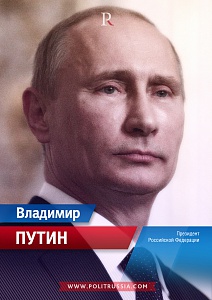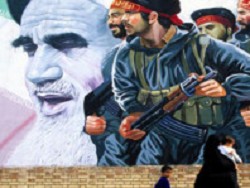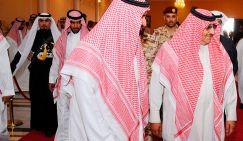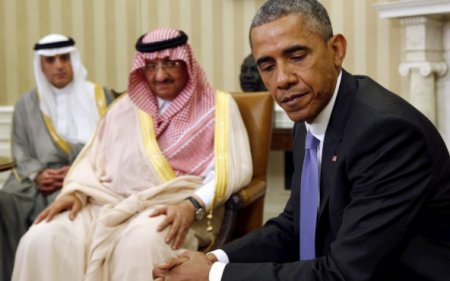
Tehran and Riyadh are very sensitive to any statements in relation to each other and try not to leave unanswered the remarks to him. And now cost the Minister of foreign Affairs of Saudi Arabia during a speech in Japan, to hurt Iran, as this was followed by a sharp statement of the leader of the Persian state. All this is immediately turned into a scandal, which again reminds us of the threats to the region and the world, which stem from longstanding Iranian-Saudi conflict.
The religious aspect
Spiritual and secular leaders of Iran banned its citizens from making the Hajj this year, subjected to fierce criticism of the organization of the Hajj by the Saudis, and most importantly – Saudi measures to ensure the safety of pilgrims. The validity of the charges provided the tragic events of last year, the anniversary of which is celebrated in these days in the middle East. Then, in September 2015 from two tragedies – the fall of a tower crane at the main mosque of Mecca and the deadly stampede in Mina valley – has claimed according to various estimates, from 800 to 2,500 lives of pilgrims, many of whom were Iranians.
Monday September 5, Ayatollah Khamenei called Saudi Arabia “a small and despised by Satan in the service of the great Satan USA”.

Video: YouTube
According to Khamenei, that the Saudi authorities prevent the implementation of the Hajj Iranian Muslims, refusing to establish direct air routes from Iran to the Holy cities. The spiritual leader of Iran believes that the Saudis brought so important for Muslims as the Hajj to the level of tourist trip. Moreover, considering that the Saudis manipulate believers for their own purposes, Khamenei appealed “to revise the procedure for the control of two Holy places and the issue of Hajj”.
With this assessment of the behavior of Saudi Arabia agreed and the President of Iran Hassan Rouhani,saying:

In addition to all their crimes the Saudi government even more tarnished this year by blocking the road to God.
Hassan Rouhani
Such statements did not go unnoticed in Saudi Arabia and here the Grand mufti of the Kingdom Abdulaziz Ali Sheikh calls the Iranians “not Muslims”, explaining that the religion of the Iranians is based on Zoroastrianism, not the pure Islam. This, according to Sheikh explains the struggle of Iran with the Sunnis.
It would seem that the traditional confrontation between Tehran and Riyadh on religious grounds aggravated again because of differences in the understanding of the true precepts of the prophet Muhammad. However, if you look at what is happening a little wider and push the time frame for the assessment of the conflict, the picture is somewhat different.
As rightly pointed out by senior researcher, Institute of Oriental studies Elena Dunaeva: “Relations between Iran and Saudi Arabia are high, especially during the last year. Based on political reasons, not religious.”
Indeed, the refusal to participate in the Hajj from Iran was made in may, 4 months before today’s events. And even then the Iranian high-ranking officials accused Saudi Arabia of interfering for the Muslims of Iran.
The essence of the question was to ensure that, taking account of the rupture of diplomatic relations, which occurred after the execution of a Shiite preacher in Saudi Arabia earlier this year, and the subsequent attacks on the building of the Saudi Embassy in Iran, the Saudi authorities insisted that the Iranian pilgrims wishing to perform Hajj, addressed to the diplomatic mission of Saudi Arabia to neighboring Iran States to obtain visas.
Direct travel from Iran to the Saudis consider not wanted, thus trying to punish Iran for winter events. Now the Iranian leaders are actually just confirmed their spring decision. So why is there this verbal skirmish with Saudi religious and political figures there’s a boom?
In fact, the reason the situation in the middle East, the difficulties in the economy and talks on stabilizing the oil market.
The situation in the region: Iran comes, Saudi Arabia loses
The current mutual accusations of Tehran and Riyadh, as already noted, began with the statements of the Minister of foreign Affairs of Saudi Arabia during his visit to Japan immediately after the meeting of G20 in China. Minister Adel al-Jubeir spoke about Iran’s policy in the middle East, accusing Iran of continuing to aggravate tension in the region. According to the head of the Saudi foreign Ministry, Iran has not abided by international law, supporting Assad in Syria, Hezbollah in Lebanon, Houthis in Yemen. In addition, the Iranians contribute to the growth of tension in relations with Saudi Arabia, Bahrain and Kuwait.
Such sharp attack in Tehran was a slightly veiled words of the great Iranian nation and its great history, but it was only the Eastern figure of speech, that conceals is actually offensive to Iran’s statements. Indeed, otherwise the Iranian leadership had to react to the proposal to abandon the policy implemented by the country since 1979 for the sake of “joining the world community”.
To offer Iran to wipe out the legacy of the Islamic revolution is still that somewhere in the midst of the cold war to offer the Soviet Union to ban the Communist party.
Such sharp statements have several purposes, one of which is to try to bring Iran back to the position of a rogue state. After the successful conclusion of an agreement on Iran’s nuclear program Tehran is actively returning to international politics. Is growing its partnership with Russia. Part of the Iranian military in the armed conflict in Syria is actually accepted by the West as a given. Shiite rebels in Yemen, also rely on the support of Iran. In Lebanon carried out by the Saudis attempts to oust from power the Pro-Iranian force and Hezbollah are also special success have not. In Iraq, albeit with difficulty, but kept the Shiite leadership. The discontent of the Shiite majority with their position in Bahrain threatens the absolute power of the Sunnis in this country.
And Western leaders can say, at the first opportunity rushed to Iran with assurances of love and friendship. The statements of the Saudis that Iran’s policy does not give him the opportunity to join the international community look weak against the background of the ongoing visit to Iran, President of the National Assembly of France Claude Bartolone.
Saudis have the same success in the international arena is not much. Blitzkrieg in Yemen failed. Moreover, the fighting has spread to the southern areas of Saudi Arabia itself. And inside antimusical coalition initial unanimity is not observed.
In Syria, Saudi protégé in the form of opposition to Assad armed groups were in a difficult position: on the South, and the North government troops, though with difficulty, but manages to push the armed opposition.
And besides, part groups joined the truce with the Syrian army.
The prospects for negotiations between the parties to the conflict are now quite ephemeral, and therefore Saudi Arabia cannot openly interfere in the political process under the guise of protecting the interests of the opposition. The military participation of Saudis in the campaign practically impossible. Here, the initiative clearly caught the Turkey, and Riyadh have only to speak about full coincidence of positions of two countries on the Syrian issue.
Of course, the supply of weapons, financing of the opposition, the Saudis continue, but here too it is impossible to go too far. God forbid, in relations between the US and Russia will be another reset, for example, the result of the election of the new President of the United States, the West will not hesitate to hang all terrorist dogs in Riyadh. And it threatens what is already in Saudi Arabia can be in the role of outcast.
The internal situation: the decline of the Saudi Kingdom and the encouragement of Iran
The internal political situation and the economic situation in Saudi Arabia remain difficult. Given the large number of princes, in varying degrees, eligible for the Saudi throne, the present king and his entourage cannot but feel concern over the possible emergence of new challengers to the throne.
King Salman is trying to steer away from the current verbal battles with Iran. Although it seems it would be logical to expect the response of the king to call for the establishment of international control over the territory of Mecca and Medina, is in fact an encroachment on the sovereignty and territorial integrity of Saudi Arabia, no official statements from king Salman was not followed. It’s more like a desire to distance themselves from events that could bring negative consequences for foreign policy and to sharpen the internal contradictions in the country.
In addition to Palace intrigues the Saudis have a whole bunch of problems. This restless situation in the East of the country where a significant proportion of the population is Shia.
By the way, there are also the largest oil fields in the country, so destabilization in the region could deal a serious blow to the economy of the Kingdom.
So still not resolved the issue with the situation of migrant workers. Payments crisis struck the sector of the Saudi economy, which were tied to foreign contractors or companies, attracting cheap labour from abroad. This primarily concerns the construction sector: for thousands of Indian and Pakistani workers. In Saudi Arabia they actually are second-class citizens, but they are not profitable now to leave the country because then I will lose all hope for the return of debts.
The situation of foreign workers a threat to the Saudis that could complicate international relations with a number of important kingdoms of the countries, such as Pakistan. And though it is a strategic ally of Saudi Arabia, but in light of the worsening problems of migrant workers may reduce the level of support for Saudi foreign policy. And this conflict with Iran (only political), and the war in Yemen, and so on.
But perhaps the main challenge of the current Saudi regime was the problems in the economy. By the end of 2015, the budget deficit of the country rose to 16%, becoming the worst indicator among the countries “Big twenty”. Foreign exchange reserves are consumed at an enormous speed. This year the government is making great efforts to improve the situation. The sequester tens of billions are subjected to government spending and investment. Increases the tax burden. But these measures cannot fully compensate for the loss of the country from low oil prices. The government hopes to keep the deficit within 10%.
Iran the situation is somewhat different. Unlike Saudi Arabia, the mood of the political and business elite, as, indeed, the General population, are more optimistic.
In Iran, the feeling prevails that the country has stood in confrontation with the West, now, before it opens new development opportunities.
In addition, under the sanctions, Iran was largely limited to export their hydrocarbons. After the lifting of sanctions, Tehran is stepping up production and export of oil and gas while lowering the price of oil kompensiruet increasing production volumes.
The oil game
Since we’re talking about the impact of oil on politics of middle Eastern States, it is worth noting that the Iranian-Saudi relations have a significant impact on the world market, and these verbal skirmishes can lead to significant volatility in world prices.
On the eve of the G20 summit there was evidence of negotiations between Russia and Saudi Arabia on the issue of stabilization of world oil production. These rumors were confirmed in the course of bilateral Russian-Saudi meeting on the sidelines of the summit.
Additional confidence was added, and the statements of the President of Russia Vladimir Putin. During an interview with Bloomberg, he expressed hope for the future arrangements of the countries-oil producers:

I would love to hope that all the participants in this market are interested in maintaining a stable and equitable global energy prices, after all in the end will make the necessary decision.
Putin Vladimir Vladimirovich
Such statements had a positive impact on prices, which in recent days has increased by 5%. The price of Brent crude oil came close to the 50 dollar mark. Possible agreement on the control of oil production has already welcomed a large number of players.
It is expected that from 26 to 28 September in Algeria during the energy summit representatives of Russia, Saudi Arabia, OPEC management will hold informal talks on the issue.
Despite the potential benefits from increased oil prices, Iran continues to pursue a long-articulated position. According to the Minister of oil of Iran of Bijan Namdar the Zanganeh, his country supported the policy of stabilization of the world market and considers a fair price in the range of 50-60 dollars per barrel. However, the caveat is that while Tehran does not intend to abandon its traditional terms — to allow him to increase production to preganglionic values. Now the figure is around 3.8 million barrels per day. By the end of the year, the Iranian oil workers can increase production to 4 million, and next year as a real landmark, consider the figure at 5 million.
This position is not the taste of the Saudis, who already disrupted the stabilization agreement on restriction of volumes of extraction in Doha due to the unwillingness to make an exception for a strategic adversary.
Himself being in dire economic Straits, Riyadh hopes that similar problems in Russia and other producing countries will be forced in the end to go for market stabilization, but on Saudi terms. That is why the representatives of the Kingdom reserves the choice to opt out of the agreement. Just a few days before the summit in Hangzhou oil Minister of Saudi Arabia Khalid al-falih said that his country sees no need to intervene in the market situation and the current quotes are quite satisfied with the Saudis.
But Iran in turn has a trump card in the ongoing oil war for survival. And the trump card — Russia. Apparently allied relations between Moscow and Tehran are playing a more important role for the Russian leadership than questionable concessions in the oil market. So, President Putin, referring to possible concessions to Iran in issues of limiting production, said:

…We understand that Iran is starting from a very low position associated with the known sanctions against this country, and it would be unfair to leave it at this sanction level. I think that actually from the point of view of economic expediency and logic would be correct to find some sort of compromise, I am sure that everyone understands this.
Putin Vladimir Vladimirovich
Such statements of the parties does not contribute to the rapprochement and compromise, and therefore many observers are skeptical regarding the results of the Algerian forum. The agreement to limit production, has not yet happened is, once again, depends on the willingness of the Saudis and the Iranians to make concessions.
The bellicose rhetoric, the newly published on the front pages of Newspapers, only strengthens the belief that neither the Saudis nor the Iranians are not willing to make concessions to their rivals. The survival game continues. Despite desperate attempts by Riyadh to keep the Iranian foreign policy successes, the Kingdom is not yet able to boast of significant results. On the contrary, difficult economic situation, an unsuccessful protracted war in Yemen, the weakening of Syria and the whole middle East can cause the monarchy to collapse. But it would be in the hands of Iran, which, like a predator in ambush, patiently waiting for the opponent totally exhausted itself.
Earlier, the Saudi monarchy could rely on allied relations with Washington, but now they have become wayward competitor of American oil shale, and America is not eager to give up everything for his ally.
In an attempt to save the situation, the Saudis are ready to seek support from Russia, but then their foreign policy can hardly be called a success. Not rejecting the proposals, Russia is keenly aware that the Saudis, with all the words about cooperation remain its adversary in the political settlement in Syria and a rival in matters of the oil trade.
***
The current aggravation of the Iranian-Saudi relations need to be assessed in the context of regional geopolitical developments of the recent years, trying not to succumb to the loud propaganda clichés on both sides. The accusations of the neighbors, attempts to use the religious feelings of its citizens and outright insults that are on the shores of the Persian Gulf is only a screen long and uncompromising struggle of Iran and Riyadh for regional leadership. Who will win in this confrontation and will not intervene if the external players in the conflict, time will tell. And while each side hopes that the first will see the fallen from exhaustion of the enemy.








